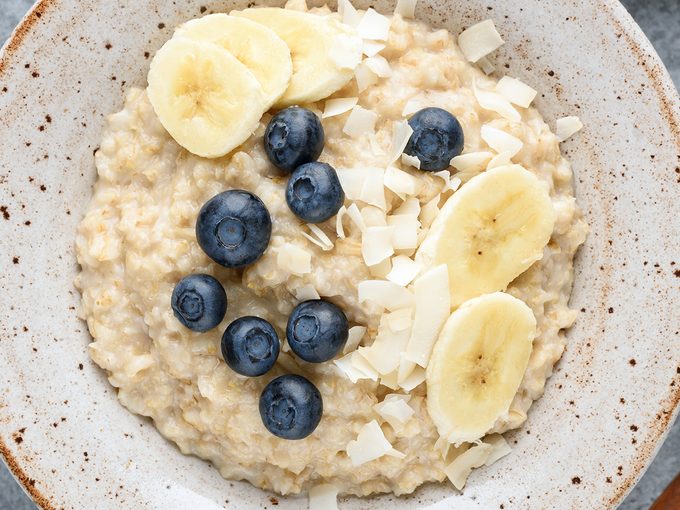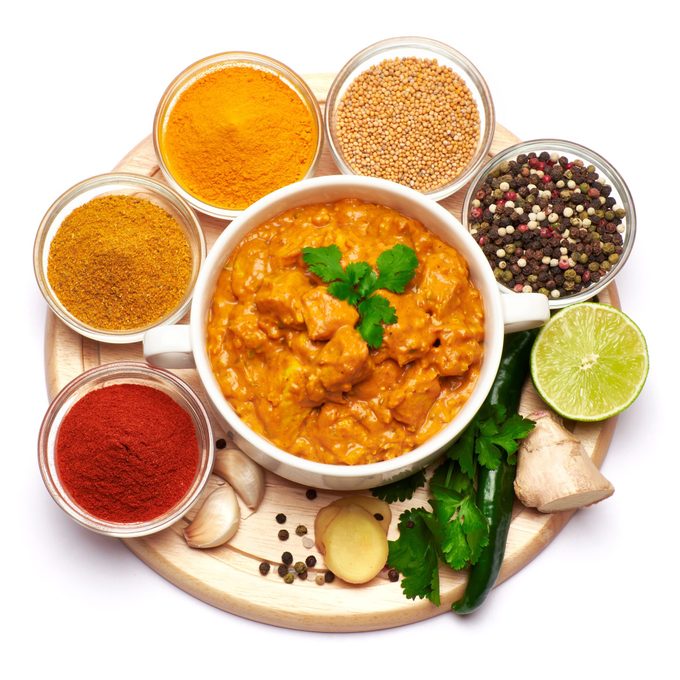Even if you’ve never chugged coconut milk from the carton, there’s a good chance you’ve had coconut milk before. It’s one of the star ingredients of curry and other Indian food recipes, giving dishes a creamy texture and rich flavour. It’s all the rage these days, joining the ranks of almond milk, soy milk, and rice milk as one of the most popular plant-based alternatives to dairy milk. But coconut milk is also relatively high in calories and saturated fat, which may have negative health effects.
So should you be incorporating coconut milk into your diet? We ask experts to help us get to the bottom of it.
(Related:What You Need to Know About Plant-Based Milk)
What is coconut milk?
The milk comes fromno surprise herecoconuts. Crack open a mature coconut (the hard, furry, brown kind) to find white flesh on the inside. The meat is shredded and mixed with water, then strained to produce a creamy milk. There are distinctions between the coconut milk beverages you pour in your coffee, tea, and smoothies and the coconut milk used for cooking. The percentages of coconut to water can differ from one type to the next, and often other ingredients are added.
Different types of coconut milk
Coconut milk products can differ in a lot of ways, including the container (can versus carton), texture (thick versus thin), and how processed they are. Supermarket shelves are packed with coconut milk beverages, which often come in cartons and appear beside plant-based milks like almond, hazelnut, and soy milks. This type of coconut milk is a good option for pouring into coffee, tea, smoothies, and other drinks. If you’re eating cereal with plant-based milk, you’ll choose this kind.
The coconut milk you’d use for cooking is often sold in a can. “Canned coconut milk usually has a thick, cream-like consistency, while coconut beverages tend to be thin and have a consistency closer to cow milk,” says Danielle Gaffen, a registered dietitian nutritionist and nutrition consultant based in San Diego, California.
“The milk beverages often also contain added flavour, thickeners, and stabilizers, so they are considered more ‘processed,'” says Melina B. Jampolis, MD, an internist, board-certified physician nutrition specialist, and author of Spice Up, Live Long.
Don’t confuse either type of coconut milk with coconut waterthat’s the liquid found naturally in young green coconuts. Coconut water is about 95 percent water, and is low in calories and fat. While it contains electrolytes like potassium and sodium and can be used as an alternative to sports drinks for rehydration, coconut water tends to have lower levels of certain nutrients than coconut milk.
(Related:The Ultimate Plant-Based Milk Guide If You Just Can’t Do Dairy)
Coconut milk nutrition facts
One major way the two types of coconut milk differ is in nutrition. “For example, one cup of canned coconut milk has six times the calories as one cup of sweetened coconut beverage,” says Gaffen.
Coconut milk beverage nutrition facts
Here are the nutritional benefits and recommended daily values (DV) for a cup (240 milliliters) of So Delicious unsweetened coconut milk beverage:
- Calories: 45
- Fat: 4.5 g (6 percent DV)
- Saturated fat: 4 g (20 percent DV)
- Protein: 0 g (0 percent DV)
- Carbs: 1 g (0 percent DV)
- Calcium: 130 mg (10 percent DV)
- Iron: 0 g (0 percent DV)
- Potassium: 0 mg (0 percent DV)
- Magnesium: 35 mg (8 percent DV)
Canned coconut milk nutrition facts
Here are the nutritional benefits and recommended daily values (DV) for a cup (226 grams) of canned coconut milk:
- Calories: 445
- Fat: 48 g (61 percent DV)
- Saturated fat: 43 g (215 percent DV)
- Protein: 5 g (9 percent DV)
- Carbs: 6.4 g (2 percent DV)
- Calcium: 40.7 mg (3 percent DV)
- Copper: .5 mg (56 percent DV)
- Iron: 7.5 g (41 percent DV)
- Potassium: 497 mg (11 percent DV)
- Manganese: 1.74 mg (75 percent DV)
(Related:What Is Plant-Based Protein and How to Add More to Your Diet)
Coconut milk benefits
The various coconut milk products may have varying health benefits, but there isn’t sufficient research on canned coconut milk in particular. Of all coconut products, coconut oil has been studied the most in depth. Coconut oil has much higher levels of calories and saturated fat than coconut milk.
Might reduce inflammation
Lauric acid is a type of fat found in coconuts. And some studies suggest it may help the immune system, thanks to its anti-inflammatory and antimicrobial properties, says Gaffen.
“Coconut products are rich in lauric acid, which has been shown to be antimicrobial and has the potential to improve gut health, which we know is good for reducing inflammation and promoting overall health,” says Uma Naidoo, MD, a nutritional psychiatrist, professional chef, nutrition specialist, and the author of This is Your Brain on Food.
Offers an alternative for people with milk allergies
If you have an allergy to cow’s milk, are lactose intolerant, or follow a vegetarian, vegan or plant-based diet, coconut milk beverages make good alternatives. “Because coconut milk is a nondairy milk, using it as a substitution for cow’s milk may help those with lactose intolerance or milk allergies,” explains Gaffen.
It may offer you an alternative way to eat your cereal or create creamy coffee, but it falls short of dairy milk in one major area. “Don’t make the mistake of thinking that it is a good source of protein, like dairy milk,” says Dr. Jampolis. Coconut milk is a low-protein food.
(Related:Is Coconut Aminos Healthier Than Soy Sauce?)
Risks or side effects
It’s high in calories
As delicious as canned coconut milk tastes, there’s no denying that it’s high in calories. If you want to maintain your weight or lose weight, consuming coconut milk may not be the best choice. “I had a patient who misunderstood and put it in her smoothies for a week and gained weight,” shares Dr. Jampolis.
If you can’t live without it, try a light version. “‘Lite’ coconut milk is canned coconut milk with more water added, so may be recommended for this population,” says Gaffen.
Or, better yet, pick a different plant-based milk.
It may raise cholesterol levels
Because coconut milk is high in fatand saturated fat in particularit may increase your cholesterol levels. “Coconut milk is high in saturated fat, and saturated fat has been linked with increasing “bad” LDL [low-density lipoprotein] cholesterol and the risk of heart disease,” says Gaffen.
Of course, Dr. Naidoo points out, whether coconut milk can raise cholesterol is still being debated. On the whole, researchers need to conduct more studies to understand the effects and relation between coconut milk and cholesterol.
You could be allergic
If you have tree nut allergies, you may want to avoid coconut milk. Coconut isn’t a nutit’s a fruit, though the Food and Drug Administration recognizes coconut as a tree nut. “A small percentage of people with tree nut allergies are also allergic to coconut,” says Jodi Greebel, a pediatric dietitian and nutrition consultant.
This has to do with coconuts’ makeup. “The protein found within coconut is similar to those found in tree nuts,” explains Gaffen.
(Related:These 9 Foods Are the Most Common Causes of Food Allergies)
Choosing coconut milk
Shopping the grocery store aisles can be overwhelming. So many brands offer so many similar products! But not all canned coconut milk is created the same way. Reading the nutrition label is important and can give you insightful information. “Canned coconut milk should really only contain coconut,” says Dr. Naidoo. “Choose the beverage version with the least number of ingredients possible in order to be consuming the most natural of products.”
Sometimes sugar or sweeteners are addedthis goes for canned coconut milk as well as coconut milk beverages. That’s another good reason to pay attention to the label. “Always opt for the unsweetened version of the beverage to both reduce the sugar content and the calories,” says Dr. Naidoo.
Pay attention for ingredients that may cause stomach discomfort. “Be on the lookout for added sugars, preservatives, and thickening/stabilizing additives like gums,” says Gaffen.
These additives can cause digestive issues or bloating, says Greebel. When buying cans of coconut milk, check the label to ensure they are BPA free. “Otherwise, BPA can leach into the milk,” says Greebel. “My preference is to buy ones in cartons, which do not contain BPA.”
What’s the best way to use coconut milk?
This creamy liquid can be enjoyed in a variety of dishes, from soups and stews to desserts and smoothies. “I prefer using a canned organic version and adding this to flavourful Asian curry dishes and vegetable soups for added creaminess,” Dr. Naidoo says.
Although there may be an association with coconut milk and curry dishes, you can use for baking or as a cream substitute in some recipes. (Full-fat canned coconut milk has significantly fewer calories than cream, explains Gaffen.)
Just keep portion sizes in mind. “A small amount of coconut milk goes a long way, so if you are trying to make food or beverages richer, you can use a small amount to make your food more tasty and satisfying,” says Greebel. One thing to keep in mind: the two types of coconut milk can’t be used interchangeably when it comes to cooking. That has to do with how they’re each processed, Greebel explains.
(Related:8 Healthy Plant-Based Snacks Youll Actually Want to Eat)
Can coconut milk be part of a healthy diet?
If you’re wondering whether you should cut coconut milk from your diet entirely, you’ll be happy to hear that it’s fine to enjoyed every now and then. “As a nutritional psychiatrist, I always suggest eating a diet rich in fibreplant foods, clean proteins, and healthy fats, which has been shown to reduce symptoms of almost all chronic illnesses, such as heart disease, diabetes, obesity, and poor mental health,” explains Dr. Naidoo.
Cooking with coconut milk on occasion fits into that kind of diet, she says. “[It] can certainly contribute to improved health when consumed.” That said, don’t go overboard. If coconut milk becomes a staple of your diet, you could be getting too many calories and too much saturated fat.
Inspired to whip up some coconut milk-containing foods? Try these simple coconut milk recipes.
Recipe: Coconut Oatmeal
Courtesy of Danielle Gaffen
Servings: 3Prep time: 5 minutesCook Time: 25 minutes
Ingredients
- 1 (14 ounce) can of light coconut milk
- 1 cup rolled oats
- 2 Tbsp honey
- 1 tsp ground cinnamon
Instructions
- In a small saucepan, bring coconut milk to a gentle boil over medium-low heat.
- Stir in oats and honey.
- Lower heat and simmer until milk has been absorbed, about 15 minutes.
- Sprinkle cinnamon into oatmeal.
- Cook until oats are creamy and flavours are combined, about 5 minutes.

Recipe: Homemade Curry Sauce
Courtesy of Melina B. Jampolis, MD, and chef Aaron Robbins
Servings: 3 to 4 cups
Ingredients
- 1 tablespoon olive oil
- 1/2 cup yellow onions, chopped
- 1 tablespoon minced fresh garlic
- 1/2 lemongrass stalk, chopped very fine
- 1/2 celery stalk, chopped
- 1/4 cup fresh cilantro
- 1/2 tablespoon turmeric
- 1/2 teaspoon whole coriander
- 1/2 teaspoon whole cumin
- 1/2 teaspoon ground ginger
- 1 (14-ounce) can coconut milk
- 1 tablespoon yellow curry paste
- Juice of 1.5 limes
- Kosher salt, to taste
Instructions
- Saut the onions, garlic, lemongrass, celery, cilantro, and spices with the olive oil on medium-low heat.
- Add the coconut milk and curry paste, and simmer for 30 minutes.
- Blend and season with the lime juice. Add salt to taste.
- Strain through a strainer for a smoother sauce.
- Use this sauce with roasted fish, chicken, or lamb.
The post The Health Benefits and Risks of Coconut Milk appeared first on Best Health Magazine Canada.


0 Commentaires